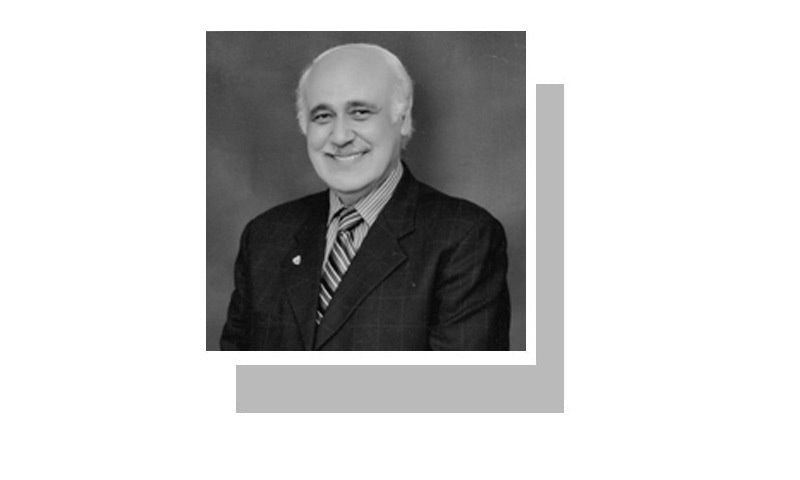
THE recent by-election for NA-120 in Lahore has been a contest between a doctor and a patient: Dr Yasmin Rashid a gynaecologist versus Kulsum Nawaz, under treatment for lymphoma in a London hospital. It is only in Pakistan that such shadow boxing at a distance could yield a result. Only here, even before the official results have been announced, could the losers complain of electoral dyspepsia.
NA-120 is a constituency with 321,786 voters. (PML-N numerologists saw the last three digits as a sign.) The turnout (39.4 per cent) ought to have been higher, considering the constituency has 142,144 female voters and both the candidates were women. The verification process could have been neater. Every voter has a CNIC. Each could have been checked from Nadra’s biometric records. Instead, only 30,000 out of the 126,860 who voted were tested biometrically, leaving the glaring loophole (through which the PTI has jumped, claiming that 29,000 suspect votes stand unverified. Such a figure might have been hidden in a landslide; in a majority of only some 14,700 votes, it assumes contentious significance.
The NA-120 result is viewed differently by stalwarts using the same PML-N binoculars. Has Maryam Nawaz, who campaigned on her absentee parents’ behalf, succeeded in retaining her family’s seat, or has she failed for not enhancing his previous majority of almost 40,000 votes?
Maryam’s ‘uncles’ are already giving her gratuitous tutorials.
That Maryam Nawaz has emerged with a political contour of her own is now undeniable. To the press, she is the Ivanka Trump of Pakistani politics, a step away but illumined by the spotlight that surrounds her father. Within the PML-N, she is being compared to that other Daughter of the East — Mohtarma Benazir Bhutto.
Is there a similarity between them? Yes, for one reason. Maryam Nawaz, like both Benazir Bhutto and Indira Gandhi, has to contend with the dismissive condescension of her ‘uncles’. In Benazir’s case, her uncles were Mumtaz Bhutto, Maulana Kausar Niazi, Ghulam Mustafa Jatoi, Jam Sadiq Ali and Abdul Hafeez Pirzada. In Mrs Indira Gandhi’s, the ‘Syndicate’ consisted of K. Kamaraj, Sanjiva Reddy, S. Nijalinagappa, S.K. Patil and Atulya Ghosh.
Maryam Nawaz’s ‘uncles’ have already begun giving her gratuitous tutorials. Saad Rafique — her father’s single-track railways minister — has advised her publicly “to be cautious in her speeches”. Chaudhry Nisar — a loyal acolyte of her father for 33 years — has been part of her father’s inner circle since Maryam was 11 years old. Chaudhry Nisar, no longer the powerful minister of interior, ventilates his pique (some critics call him ‘The Incredible Sulk’) against his mentor Nawaz Sharif privately and with uncharacteristic indiscretion publicly. He now targets the daughter. He discounts any comparisons with Benazir, saying Maryam can consider herself a leader only after, like Benazir, she spends time in prison. (He himself did not.)
He taunts Maryam as only ‘the daughter of Nawaz Sharif’, forgetting perhaps that Benazir Bhutto happened to be only the daughter of Zulfikar Ali Bhutto, that Sri Lankan Chandrika Kumaratunga was the daughter of Solomon and Sirimavo Bandaranaike (both prime ministers), and Aung San Suu Kyi the daughter of Aung San (the founder of modern Myanmar).
The results of NA-120 throw into relief once again the questionable efficacy of democracy as a political system in a politically immature, erratic country like ours. Is there any merit in a system that rewards the winning party first past the post and punishes those who were only marginally behind? Should we, simply because we were once a British colony, imitate Westminster when we have neither the Thames nor the Old Bailey nor the monarchy nor an unwritten constitution?
Why do we have to ape the West? Patently we have a speaker whose voice is unheeded, a leader of the opposition behind whom (it is happening to Syed Khursheed Shah) the smaller parties are reluctant to line up, and treasury benches when the country’s treasury is in foreign bank accounts, beyond the claws of legal retrieval.
There is an argument to be made for having a system of representative government. Let the seating in the National Assembly be reconfigured into an inclusive circle, not demarcated by divisive aisles. Let each party be given seats in the national cabinet representative of the number of votes it secures in the elections. Like that, policies and decisions would reflect and resolve the needs of all 207 million (and still counting) Pakistanis citizens, not whet the appetites of a lucky coterie.
The COAS Gen Qamar Javed Bajwa has disclosed that he wants enhanced interaction with parliament. He has stopped short of recommending a National Security Council. Since 1978, when he came of age, Gen Bajwa must have been voting in every general election. Like the rest of us, he too must wish our warring parliamentarians would interact occasionally — with each other.
The writer is an author.
Published in Dawn, September 21st, 2017











































